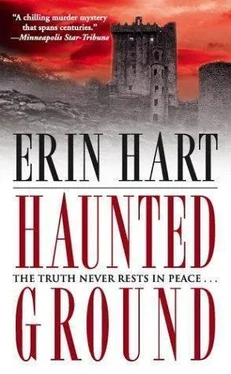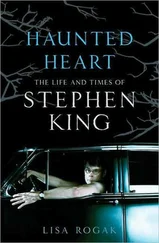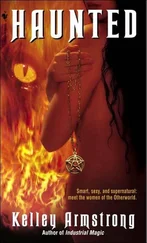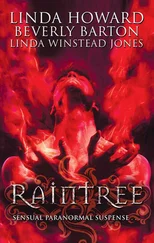“I suppose you’re right, like all those allegorical songs with the veiled references to Napoleon coming to save Ireland. Robbie has a song that doesn’t mention the lady’s name, only gives a cryptic anagram of her initials—I’m still trying to figure it out. But you know, there are a couple of things that don’t fit. Mrs. Cleary’s song is about a soldier transported for fourteen years, and Cathal Mor wasn’t a soldier; he was an outlaw, and transported for life. And the song says, ‘they’ve murdered thee,’ but there’s pretty good evidence to say our red-haired girl was executed—she couldn’t be both.” Nora had been slouching in the window ledge, but now sat forward abruptly to peer through the glass.
“What is it? What do you see?” Cormac joined her at the window.
“It’s just the new moon. There, do you see it?” She murmured under her breath: “‘I see the moon and the moon sees me—’” To her surprise, Cormac joined in: “‘God bless the moon and God bless me.’” He was close beside her, and his warm breath stirred in her hair. There was something strange about the sound of their voices joined in the darkness, as if this harmless, whispered prayer were a sort of spell or incantation. Perhaps that’s what it was, an ancient attempt to harness the frightful power of the moon, and to use that power for good and not for mischief. Nora shivered, and suddenly felt anxious having him stand so close. If she weren’t careful, the voices of reason and temperance could so easily be drowned out by the sound of her own pulse. And yet for some reason, she couldn’t move.
“Nora? Could I ask you something?” She didn’t answer, but could sense his unease as he sat down beside her on the deep window ledge. “That very first day, when we were out on the bog, something Devaney said seemed to upset you.”
The silence between them grew, but he waited, unmoving. He’d shared with her his most private thoughts, things he had never revealed to anyone else. What could she do but answer?
“It wasn’t anything Devaney said,” she began. “At least not at first. It was the red-haired girl. My sister Triona had the most gorgeous red hair, masses of it, thick and wavy. I was always so envious. When I was twelve, and Triona was seven, I had to brush her hair every morning before school. It was one of my chores. I grumbled a lot, but I secretly enjoyed it. You’ve no brothers or sisters?”
“No.”
“Those five years between us were like a gulf at the time. They seem so insignificant now. When I saw that red hair coming out of the turf…Everything that reminds me of Triona also reminds me that I was at least partly responsible for her death.”
“Why would you think that?”
“Because I was the one who convinced her to leave her husband, and the very next day she disappeared. It wasn’t just coincidence, Cormac. When I had to identify her body, the way I knew that it was Triona was all that lovely red hair. I couldn’t look at her face, you see, because she didn’t have a face anymore.”
“Ah Jesus, Nora.”
“And I was the only one who knew it was Triona’s husband who killed her. I knew it. The police believe it now as well, but they can’t do anything. He’s been questioned, but there’s never been enough evidence to arrest him. It turned out that Triona never told anyone but me about how Peter got some sort of twisted pleasure from hurting her. She said she was too ashamed to tell anyone. He was smart enough never to raise a hand to her in public. Why should anyone suspect him? He’s rich, he’s handsome, he’s on the boards of dozens of worthy charities. He had everyone actually feeling sorry for him because of the theory he put forward, that some crack-head carjacker must have killed my sister. He swore she never once mentioned leaving him, so that made it my word against his, and lots of people started to think I was crazy. He told the police that he and Triona spent the evening at home, then she went off to the health club for a massage the following morning and never came back. Her car turned up in a parking ramp four days later. Her body was in the trunk.”
“And there was nothing to link her husband, no physical evidence at all?”
“Nothing, despite the fact that he had no real alibi. Through all of it, I kept telling myself that I didn’t want revenge, that all I wanted was justice. I’m not even sure what that means anymore. When Triona’s case was put in the drawer with all the other unsolved murders, Peter filed the claim on her life insurance. Of course the insurance company denied it, since he was still the main suspect, but he sued and they eventually had to settle out of court. He took the money, and he took my niece, and he moved as far away as he could get. I haven’t seen Elizabeth for nearly four years; she’ll be eleven in October.” Nora paused and looked up at Cormac. “She’s already lost her mother, and I would gladly have taken her father away as well. If I’d had a chance in hell. But it seems I didn’t.”
“Is that why you’re here?”
“Desperately trying to patch together what’s left of my life and my sanity.”
“I’m so sorry, Nora.”
“I might have been okay about the red-haired girl if Hugh Osborne hadn’t shown up, looking for his missing wife. With no alibi, and no evidence against him.”
She could see by Cormac’s expression that something had finally clicked into place. He hesitated. “It seems unfair to assume that Hugh Osborne is guilty when we don’t have all the facts.”
“Then why not help me find some? We could just as easily exonerate him.”
“Nora, we can’t just go charging through people’s lives like—I mean, maybe the light I saw out there is somehow related to Mina Osborne’s disappearance, but there’s a better chance it’s not. It must have been so terrible to lose someone like that; I can’t even begin to imagine. But they’re two totally separate situations. You can’t let your own anger and frustration make you jump to conclusions about people. You must see that.”
“I saw something in his eyes, Cormac, the first night I came here. I can’t even describe it, except to say it was almost a challenge. Like he was saying, ‘Prove it,’ right to my face. You were out of the room at that point. You didn’t see.”
“I just wonder how much of it can be put down to the fact that you want him to be guilty.”
“Next you’ll be saying that I’ve come unglued.” As she spoke, Nora found the elevated pitch of her voice disconcerting, almost unrecognizable.
“I don’t think that.” Cormac’s voice softened. “Jesus, Nora, I don’t. It’s just—” He reached for her, but she pushed past his hand and crossed to the door, shedding the blanket he’d given her. When she reached for the door handle, she felt Cormac’s hand cover hers. “Please, Nora, you don’t have to leave.”
“I do.” Her voice was even. “Please let me go.” Cormac removed his hand from hers and took a step back.
When she was alone in the hallway, Nora slumped against the wall and drew in a long breath. What the hell was going on with her? Everything he’d said was perfectly rational. Hadn’t she been telling herself the same things over and over again for the past few days? She’d become so bloody defensive, and nobody deserved that, least of all Cormac. Remembering his gentleness, Nora felt overwhelmed by a sudden, hollow ache of desire. At precisely the same moment, she heard a clattering noise in the stairwell only a few feet from where she stood.
She pushed open the stairwell door. “Who is it? Who’s there?” No one. But someone had been there, watching her—perhaps watching them. When she turned to go back to the hall, her foot struck something that rolled and clinked against the wall. She stooped to pick it up—an empty whiskey bottle. As she made her way down the hall to her own room, Nora raised the bottle briefly to her nose, remembering her first chance meeting with Jeremy Osborne, and the same sweet, strong whiff of his breath against her face.
Читать дальше











